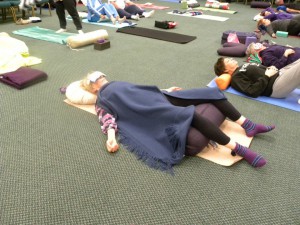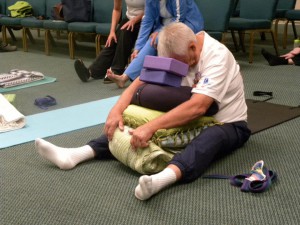 Do you allow yourself to ask for support? What does support look like to you?
Do you allow yourself to ask for support? What does support look like to you?
Let’s face it, there are moments, days, weeks even when we are in need of support and simply don’t ask. Something gets in our way – pride, fear, avoidance – so we suffer and struggle through on our own, likely prolonging our misery. And then to complicate our misery even more we grumble to ourselves and complain that no one understands, no one cares. Sound familiar?
I know for myself, one of the hardest things in this world for me to do is to ask for help. And yet I still wonder and get frustrated when I feel I am misunderstood. It is a vicious little circle that I create for myself. I start with “Nothing to see here. No, I don’t need help, I am fine, I can manage this all on my own.” And then immediately jump to “Am I invisible? Can’t you see how I am suffering? You must not know me at all if you cannot see I am in need here.” Thus creating the perfect Lose/Lose scenario. No one wins, least of all me.
Breaking the Cycle
I see this cycle repeated often in my yoga classes. As a new teacher I learn more and more each day to listen to the silent language of body cues. Especially in my Restorative Yoga classes where students hold poses for long periods of time. I always state a few times for emphasis that I am their guide, but their body is their teacher, and if a posture doesn’t feel right, don’t do it. And if your body is signaling you that it wants to move, move. And if you feel like you need more props to support you, just signal me and I will bring them to you. Then we begin our practice, and it happens almost every time – I can see someone is uncomfortable and rather than do what is needed to find comfort, they try to struggle through it.
 In yoga we always encourage finding the fine line between effort and ease and resting there. Rest is especially emphasized in Restorative Yoga – maximum benefits with minimal effort. So I allow each student the time to find their line before checking in with them. But if I see painful winces, and scrunched up noses, I immediately approach my students to support them in finding the right posture for their needs. Once their needs have been met, whether it is a change in how they are laying, or an extra prop for comfort, they let out a deep breath and relax into the posture. Often it takes persistence on my part for the student to accept the support I am trying to give them.
In yoga we always encourage finding the fine line between effort and ease and resting there. Rest is especially emphasized in Restorative Yoga – maximum benefits with minimal effort. So I allow each student the time to find their line before checking in with them. But if I see painful winces, and scrunched up noses, I immediately approach my students to support them in finding the right posture for their needs. Once their needs have been met, whether it is a change in how they are laying, or an extra prop for comfort, they let out a deep breath and relax into the posture. Often it takes persistence on my part for the student to accept the support I am trying to give them.
Even Yogis Have a Hard Time Asking for Help
They don’t want to bring attention to their discomfort – Don’t come over here and bring attention to me. Let’s just get through this.
They don’t want to be a nuisance – I’m fine, I’m fine. I don’t need anything. Nothing to see here.
They don’t want to stand out or be different – Why can everyone else do it but not me? Everyone else is relaxing into it, why can’t I?
They think it is a matter of right or wrong – If I can’t do it there must be something wrong with me. Everyone else is doing it just fine. What’s wrong with me? Maybe I don’t belong here.
They think I don’t understand – No one understands this pain I am in. There is no point trying to explain it because you just won’t get it.
They think a certain amount of pain is normal and acceptable – I have had this pain in my hip forever. It always hurts and I just live with it. It is what it is.
It is easy for me to get into my student’s heads and understand the inner dialog, because that was me, not too long ago. If I cannot ask for help in my life, dealing every day with the unpredictable nature of chronic illness, how can I ever be expected to ask for help in a yoga class? The first step is in getting out of my head (see inner dialogue above) and opening myself up to the possibility that asking for and allowing support brings.
Taking the First Step
Like any other attitude or skill we want to develop, it starts with practice. Learning to ask for help – and then allowing that help into our lives (another skill altogether worthy of its own blog post) – is something we need to work at. And like everything else we take on, I say start small – baby steps. What is one thing you can ask for support with today? Don’t wait until tomorrow. Look at today. Pick something small. Ease yourself into it.
I can hear many of you protesting – again, inner dialog I understand because I have had the same conversations in my head many times – and I know you all have valid reasons for your protests. Primarily they are based in fear. I am encouraging you to be bold in the face of fear. What would it mean for your life if you asked for and received support when you need it? What would that make possible for you? A little comfort maybe? A little ease? Is that something you want more of in your life? If so, don’t be afraid to ask.
This is something I need to work on. I don’t allow myself to ask for support and whenever I read a book or article about the importance of a support system, I just skim over that part like it couldn’t possibly apply to me. I guess my response to pain and difficulty is to isolate myself. Probably not the healthiest approach!
It is common to avoid or “skim over” something that triggers us. The fact that you are aware of your tendency to do so might mean you are ready to make a shift and start allowing yourself to ask for and receive support. Just something to consider… Please do not use any of your tendencies as a reason to be judgmental of yourself. You are truly doing the best you can in each possible moment with what you have available to you at the time. Always remember that and be kind to yourself. Change is a process, awareness is a good first step.
Hi there,
I love your post and especially how you have related your students at yoga to the struggle we go through asking for support. It is such a simple thing but for some reason we are programmed to believe that asking for support means we are somehow inferior. What a joke! It is those things that are hard to do that show real courage and strength of character. Thanks for your blog post, I love it.
Mel
Programmed is right! We are working with so many conditioned behaviors that actually work against us. Exactly why being kind and loving to ourselves is so important. It does take real courage and strength of character to ask for support. Thank you for your comment and especially for your enthusiasm. It is appreciated!
Hi, I have been living with fibro for at least 10 years. In the past three I have reached out and asked for help and support. What I am dealing with today is the question of do I deserve more support.I am a single mom and I am on disability. I want desperately to take care of my children who are 15 and 13. Their lives have been every bit as much affected as mine. Any advise or support would be appreciated. Not giving up.